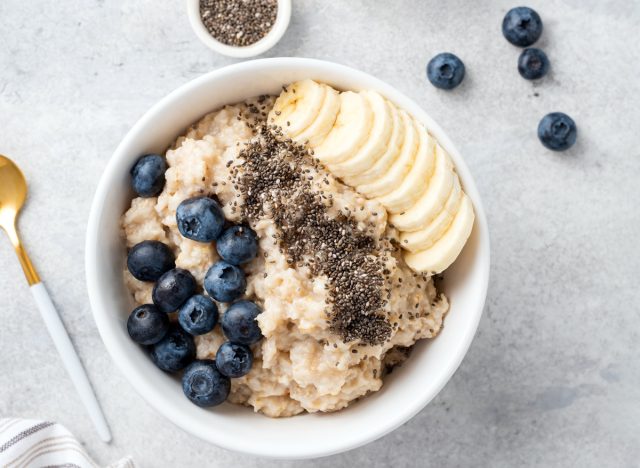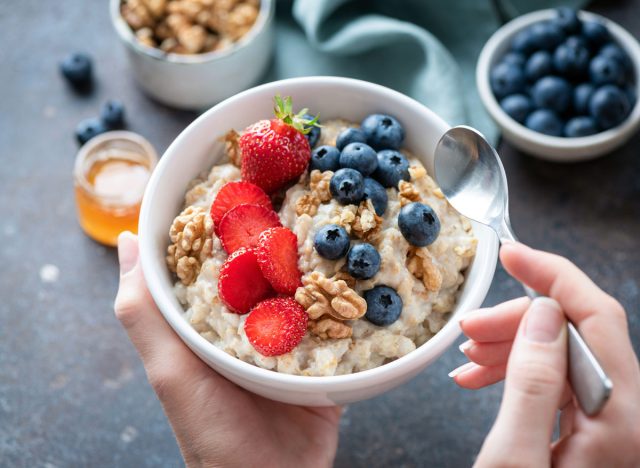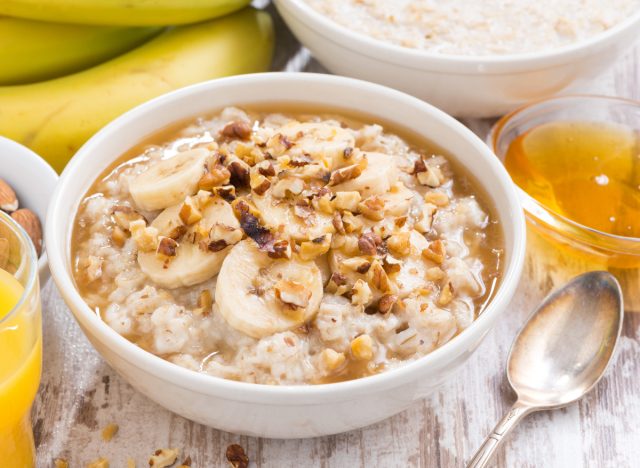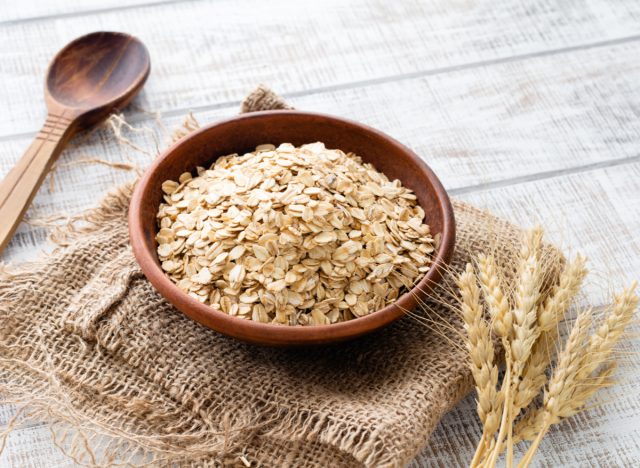Share this @internewscast.com
Colder weather may have you craving a hearty bowl of oatmeal to start your day. But did you know that eating this hearty food may significantly improve the nutritional profile of your diet and reduce the risk of some chronic conditions? Because of its many benefits, oatmeal and oats are a healthful addition to anyone’s eating plan.
You’ve probably heard how oats can lower harmful cholesterol levels and help tamp down your appetite, but you may not know how much or how often you need to eat oatmeal to reap the benefits. Here’s what you need to know about how much oatmeal to eat, as well as the healthiest ways to incorporate oats into your diet.
Read on, and for more healthy eating tips, check out What Eating Too Much Sugar Does to Your Body.
How much oatmeal should you eat?

The best way to really experience the benefits of oatmeal is to enjoy a daily serving of one cup of cooked oats (or 1/2 cup of raw oats).
A one-cup serving has four grams of fiber, as well as helpful doses of thiamin, phosphorus, and magnesium. Oats are naturally free of sodium and are low in total fat and saturated fat, and they also contain bioactive compounds, several of which are potent antioxidants.
A serving of plain oats is about 160 calories, with around 3.5 grams of total fat, less than a gram of saturated fat, and 6 grams of protein.
A serving also provides about 28 grams of carbohydrates, of which there is only 1 gram of natural sugar. However, if you enjoy sweetened instant oatmeal, it often contains added sugars.
Enjoying a serving of unsweetened oats daily, in place of a sugar-sweetened cold cereal, bagel, or donut, is a great way to help boost the fiber in your diet, add a whole grain serving to your morning, and start your day with an energy-rich breakfast that will help keep you satisfied longer.
According to USDA data, a cup of cooked oatmeal provides:
- 160 Calories
- 6 grams of protein
- 3.5 grams of fat
- 0.7 grams of saturated fat
- 28 grams of carbohydrates
- 4 grams of fiber
- <1 gram of sugar
The benefits of eating oatmeal daily

Oats can lower your cholesterol and improve your heart health
The FDA has acknowledged the heart health benefits of oatmeal for decades, stating that soluble fiber from oatmeal as part of a diet low in saturated fat and cholesterol may reduce the risk of heart disease and that 3 grams daily are needed for this benefit.
A 2019 review published in Frontiers in Nutrition also states that beta-glucan (a type of soluble fiber found in oats and barley) from oats can help reduce total cholesterol and therefore has been linked to reduced cardiovascular disease risk.
A serving (1 cup of cooked oats or 1/2 cup of raw oats) provides about two grams of soluble fiber, which is around half of the total amount of fiber in a serving of oats.
So, you’d need to eat about 1.5 cups of cooked oats or 3/4 cups of raw oats to get the three grams of soluble fiber for heart-health benefits.
They can improve your GI health and gut microbiome
Some animal-model studies show that oats can help bring more balance to the gut microbiota. Improving the balance of the beneficial type of bacteria to the harmful kind can improve immunity and may even help with weight loss and maintaining a healthy weight, according to research.
One study published in the Journal of Functional Foods found that the inclusion of oats helped prevent weight gain and increases in body fat when animals were overfed.
As a bonus for gut health, you can add plain yogurt to your oats to get the added benefits of live, active probiotic cultures that contribute to gut health and balance.
Oats may help prevent disease
According to a review article published in the journal Foods, there are many other emerging health benefits associated with eating oats, such as improved immunity and gut health, as well as a reduced risk of diseases like cancer and atherosclerosis. Other studies show that oats may help reduce inflammation and the risk of type 2 diabetes.
However, these health benefits are still considered preliminary, and more research is needed to provide significant scientific agreement.
Which type of oats are best?

The oatmeal section of most supermarkets is packed with a dizzying number of options. You can find instant, quick-cooking, old-fashioned, and steel-cut oats (also called Irish oats).
Steel-cut oats (Irish oats) are the least processed and essentially just have the hull removed from the oat groat. They take longer to cook and have more texture.
Rolled oats (also called old-fashioned oats) start as steel-cut oats and then are steamed and rolled flat under pressure. The result is a flat, flakey oat that takes less time to cook and has a softer texture.
Instant oats are made by cutting oat groats into small pieces, steamed, and rolled into thinner flakes so they cook even faster and have an even softer texture. Steaming and rolling oat groats have minimal impact on the nutritional composition of oat groats.
When it comes to the health benefits, quick-cooking rolled oats are a great option, but if you prefer steel cut, they are a great option as well. Since quick-cooking oats cook so quickly, instant oats offer minimal added convenience. Instant rolled and steel-cut all provide beneficial beta-glucan fiber, the same phytonutrients, and all are whole grains. What you do want to avoid are oats that have added sugars.
Ways you can eat oats that aren’t oatmeal

If you don’t want to eat oatmeal every day to get the benefits of oats in your diet, you can include oats in a variety of recipes. For example, many people will add oats into their muffins, pancakes, or smoothies.
Here are 10 healthful ways to enjoy oats when you get tired of oatmeal:
- Granola
- Muffins
- Pancakes and Waffles
- Smoothies
- Burgers, meatballs, or meatloaf
- Risotto
- Pizza Crust
- Bars, Balls, and Cookies
- Quick breads
- Fruit Crisps and Cobblers












